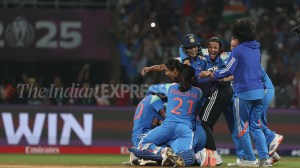From former Environment Minister Jairam Ramesh admitting that he was still “reeling from that historic 75 minutes” with President Barack Obama to negotiations over climate and defence deals, the release of emails received by former Secretary of State Hillary Clinton provides a rare insight into the growing India-US engagement during the previous UPA government.

Of the 4,368 emails, totalling 7,121 pages, released by the US State Department on Tuesday, more than 200 refer to India. And among them are emails that contain references to former PM Manmohan Singh, former External Affairs Minister S M Krishna and former Defence Minister A K Antony, apart from Ramesh.
[related-post]
Consider these:
* One mail shows that after a phone call between Clinton and former External Affairs Minister S M Krishna on “India’s broad support” for the Copenhagen climate deal, the MEA sought to clarify and “moderate the message”.
Story continues below this ad
* In another e-mail, an aide forwards a news report about a defence deal between India and US, and remarks that “Your time with Antony was well-spent”.
* In a third email, an aide writes that “Singh is doing a good thing here”, referring to the former PM calling up his Pakistan counterpart after floods affected the neighbouring country.
Among other emails, some have Hillary’s aides praising her visits to India, with one of them saying that “the Indian people are still buzzing over her visit”. There’s another which notes that the Pakistani military has called the water-sharing issue their “third most important strategic issue”.
The emails that refer to India run into about 1,000 pages, although most are about Clinton’s aides keeping her posted about developments following her visits to the country. Most emails were forwarded by her close aide Huma Abedin to Clinton.
Story continues below this ad
The emails also show that the US State Department was keeping a close track of the nuclear liability bill following the nuclear deal with India, 26/11 attacker Ajmal Kasab’s confessions, India’s plans of testing a nuclear missile, its vote in the IAEA, and official meetings between India and Pakistan. They also include the odd request for help to get an Indian visa, and sharing of experiences on Sewa, the NGO.
Ramesh’s email, of December 2009, was forwarded to Clinton by Strobe Talbott, chief of Brookings Institution and former deputy secretary of state during Bill Clinton’s presidency, who tagged it as “message from India — and from down the street”. Talbott wrote: “I’m sending you this message because — somewhat to my surprise — Jairam Ramesh has asked me to pass along a personal message. I’ve known him since the 70s…”
The message, pasted below Talbott’s message, said, “It was wonderful catching up with you in Copenhagen (for the climate talks). The opportunity to interact with President Obama and you at the very last minute to salvage the Copenhagen Accord at the US-BASIC Summit Meeting was fantastic and unforgettable for me personally. I am still reeling from that historic 75 minutes!!”
The Copenhagen Accord was finalised in a closed door meeting involving the US and the four major developing economies forming the BASIC group — India, China, Brazil and South Africa. But it was widely criticised as being weak because there were no references to any targets for emission reductions by the rich countries.
Story continues below this ad
Another email sent by an aide in September 2010 included a news report about US major GE winning an engine bid for Indian LCAs. The aide wrote to Clinton: “Your time with Antony was well-spent.”
On the nuclear liability issue, one of the e-mails in August 2010 to Clinton said, “Finance Minister… (Pranab Mukherjee) has postponed his 0930 call with the Secretary this morning; Indian cabinet to make decisions on legislation by Wednesday.”
In November 2010, an e-mail sent just before US President Barack Obama’s visit, said, “(US ambassador Tim) Roemer and (US Assistant Secretary of State Robert) Blake making good progress on nuclear liability issue, but we are not yet ready to raise public expectations.”
The Civil Liability for Nuclear Damage Bill 2010, which was passed in both Houses of Parliament after much debate, seeks to create a mechanism for compensating victims of nuclear damage arising from a nuclear incident.
Story continues below this ad
Meanwhile, another email ahead of Obama’s visit said, “Indians have expressed reluctance to announce C17 purchase; (US ambassador Tim) Roemer still working it. (NSA Shivshankar) Menon said he’s optimistic civ-nuke issues will be agreed tomorrow. Mixed press coverage of President’s upcoming trip, including controversy over cost.”
In September 2010, an e-mail quoted the PIB press release about Home Minister P Chidambaram’s appeal to media to help maintain communal harmony over the reports of a pastor in US threatening to burn the Quran on September 11. Referring to Chidambaram’s quote that he hoped US authorities would take strong action on the issue, an aide wrote: “Note last sentence about action by “US Authorities””.
In a June 2009 email, Talbott credited Hillary’s visit in 1995 as the First Lady for setting the stage for US President Bill Clinton’s visit in 2000. “I’m so pleased you’re going to India. It was your trip to the region, with Chelsea, in 95 that established the momentum for Bill’s. I’ll always remember you talk (with slide show) at State after you returned.”
After Talbott said in June 2009 that he will send his book “Engaging India” to Hillary, as she was “re-engaging” with India, she responded in July 2009 that “Engaging India is a marvelous read and sober reminder of how hard this work is”.
Story continues below this ad
The Clinton emails snowballed into a controversy after it emerged that she had used a private email account hosted on her personal server to conduct official business. This was unearthed by US State Department officials while responding to a request for documents from Congressional investigators.

 Hillary Clinton with aide Huma Abedin. (Source: Reuters)
Hillary Clinton with aide Huma Abedin. (Source: Reuters)






